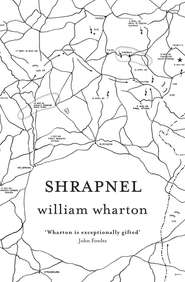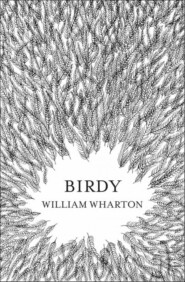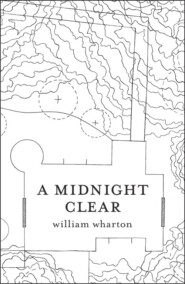По всем вопросам обращайтесь на: info@litportal.ru
(©) 2003-2024.
✖
Tidings
Автор
Год написания книги
2018
Настройки чтения
Размер шрифта
Высота строк
Поля
Tidings
William Wharton
In Tidings, one of America’s best-loved authors paints a vivid scene of an unusual family Christmas.At an old mill in the French countryside, philosophy teacher Will and his wife Loretta await the return of their four adult children for the Christmas holidays. The house is swept, the fire is lit, and the scene is set. Will is determined to make this a Christmas to remember; however, he is unprepared for the personal troubles each family member will bring to the festivities. Unsatisfied desires, affairs, and the shadow of divorce threaten the Yuletide cheer.As they struggle to resolve their issues, the family and their holiday celebrations come alive in a heart-warming evocation of the traditions, magic, and unseen labour for a family Christmas.
WILLIAM WHARTON
Tidings
To Saint Nicholas
I swept and slept
Through promise
Not kept.
Table of Contents
Title Page (#uf8ae3aed-9752-525f-808f-cac35c3afc21)
Dedication (#u483432e1-4da9-58cf-b996-cad57c1e7640)
1. A Partridge in a Pear Tree (#u9caf2fe0-e245-50d9-b015-7ce6f36cad56)
2. Two Turtle Doves (#u99b3bb0a-bfff-59cf-a50a-f4a3dfbc0c12)
3. Three French Hens (#u8abbb3aa-0620-59c9-a097-38d830f84455)
4. Four Calling Birds (#litres_trial_promo)
5. Five Golden Rings (#litres_trial_promo)
6. Six Geese A-Laying (#litres_trial_promo)
7. Seven Swans A-Swimming (#litres_trial_promo)
Also by William Wharton (#litres_trial_promo)
Copyright (#litres_trial_promo)
About the Publisher (#litres_trial_promo)
1
A Partridge in a Pear Tree
There aren’t many holly berries this year; the leaves are dark viridian green, deeply dented, sharp-pointed; but virtually no berries.
The damp, cold air shifts between fog and mist. Drifting, light, incipient snowflakes float from the darkening sky.
I have my arms full of berryless holly now, so I start down toward our heavy stone and wood ancient water mill at the bottom of this French Morvandeau valley. The streams are gushing with water; a thick, black thrust; tumbling, rounded, moss-covered stones roiling in rocky streambeds.
There’s no one up and about in our village. Those who are there sit huddled in oldness and cold, alone, beside wood fires. Even at four thirty, all shutters are closed.
This is the year’s shortest day; the sun’s declined to its nadir. Tomorrow we can watch it be born again, redeeming life for a new year.
Rounding the downhill curve, I see our own light at the mill; pink, inviting. It gleams through a small west window incised in a two-foot-thick, rough-cut, three-hundred-year-old stone wall. It’s a great window for watching late sunsets in July, also a good window to be coming home to on a near-freezing, earliest winter evening.
I go in through our cellar which opens directly onto the road. This cellar has damp, dark, cold, humid, hand-hewn granite floors.
It houses the giant cogs, shafts and flywheels of the defunct mill machinery. It’s now pungent with birch sawdust from this morning’s work; sawing wood, piling it by the fireplace upstairs in a probably futile effort to heat this mausoleum for our family Christmas celebrations.
This year, our two daughters are coming from America to join us. Our youngest child, a boy, still lives at home. Our older son is spending Christmas this year with his French girlfriend; she riding on the back of his motorcycle; the two of them eating miles of desert dust in far-off Arizona and New Mexico.
But then, after all, the first Christmas was in a desert. Our Michael-cum-Joseph guides his 500-cc Yamaha donkey, with, I hope, a not-too-pregnant Genevieve-cum-Mary in postillion. There will be room at some inn, no doubt.
Our older daughter and oldest child, Maggie, hasn’t been in France for seven years. She has left behind her five-year-old son, our only grandchild, with her husband in Arizona. She’s also considering leaving her husband.
Our other daughter, Nicole, spent a Christmas with us here at the mill three years ago. She froze, missed hot water, showers, rock music, a place to wash her hair, and a man. This time she brings a man with her. All the rest remains practically the same – easy to miss.
Our youngest, Ben, will be fifteen on the eve of Christmas Eve. He’s our only child who seems to share our atavistic, pagan Christmas feelings. For us, just being here is fulfilling. We revel in the confines of this closed valley. We are happy encircled by rolling, wooded hills, rounded sometimes with slanted pastures for hardy sheep.
Ben doesn’t particularly like to shower, wash his hair or listen to rock music. He far prefers animals to people, and animals outnumber humans by at least a hundred to one in this valley.
In a vain effort to approximate somewhat the ease and comfort of Western-states American living, and because I had no classes after I gave midterms at ACP, the American College of Paris, the school where I teach, I came down here from Paris three days early. Lor, my wife, who also teaches and has problems of her own, insisted it was probably the best thing after all, considering everything.
With me, I transported an additional heater – that should help with the freezing part. I’d also hoped to haul down a water heater and install it but there was no more room in my car. This car’s a small sports Fiat with thirteen hundred cubic centimeters of power. One might well fit it in the back of an American station wagon. It’s the only sporty thing I own; that is, if you don’t count my underwear or jogging shoes.
I transported down with me thirty meters of two-meter-wide material purchased at the Marché Aligre in Paris. Ten meters of it are bright red. With this I hope to camouflage some of the more rugged, ragged, crude aspects of the mill.
I spent the first day sweeping, dusting, knocking down cobwebs, washing windows, wiping, mopping; nailing down or supporting various idiosyncratic elements which might offend.
I swept up a fair mound of rat, or dormouse, shit and two wheelbarrow loads of general dirt, mostly chaum, fallen from chinks in the walls. These walls are slowly disintegrating; very slowly though; with help they’re good for another two or three centuries.
I also cleaned out about ten years of accumulated ash from our fireplace, the remains of perhaps one medium-sized forest.
I then, using my red cloth, made drapes for our windows. To be honest, I only stapled them to the heavy oaken lintels over each window. I used strips cut from the ends and made tie-backs to let in what little daylight there is. I even used a remnant of red cloth as cover for our eating table in the center of the room.
Now, it all looks very Christmasy, will be even more so with my dark green, although berryless, holly.
The second day, again with my trusty stapler, I climbed up to the loft where our girls, plus the imported man, will be sleeping.
There’s fiberglass insulation up there; more or less in place, but hanging somewhat indiscriminately. For reasons I don’t quite understand, our dormice like to hibernate in this fiberglass; perhaps some remnant ‘looking glass’ memory. They shred it, shape tiny nests. Probably they’ll all die of silicosis – no great loss.
I stapled twenty meters of my brown material, rafter-to-rafter, right over the fiberglass, dormice included. They won’t notice till spring (the dormice that is).
Not a creature was stirring, not even a dormouse.
With the rest of the material, I gussied up our tiny toilet room, considered by our neighbors a marvel of American ingenuity, and probably unhygienic. Our toilet was the first in town. I also braced this toilet so it won’t rock when one tips to wipe. The john’s now jammed tight by a small electric heater. This gives some solidity and welcome warmth where it counts.
William Wharton
In Tidings, one of America’s best-loved authors paints a vivid scene of an unusual family Christmas.At an old mill in the French countryside, philosophy teacher Will and his wife Loretta await the return of their four adult children for the Christmas holidays. The house is swept, the fire is lit, and the scene is set. Will is determined to make this a Christmas to remember; however, he is unprepared for the personal troubles each family member will bring to the festivities. Unsatisfied desires, affairs, and the shadow of divorce threaten the Yuletide cheer.As they struggle to resolve their issues, the family and their holiday celebrations come alive in a heart-warming evocation of the traditions, magic, and unseen labour for a family Christmas.
WILLIAM WHARTON
Tidings
To Saint Nicholas
I swept and slept
Through promise
Not kept.
Table of Contents
Title Page (#uf8ae3aed-9752-525f-808f-cac35c3afc21)
Dedication (#u483432e1-4da9-58cf-b996-cad57c1e7640)
1. A Partridge in a Pear Tree (#u9caf2fe0-e245-50d9-b015-7ce6f36cad56)
2. Two Turtle Doves (#u99b3bb0a-bfff-59cf-a50a-f4a3dfbc0c12)
3. Three French Hens (#u8abbb3aa-0620-59c9-a097-38d830f84455)
4. Four Calling Birds (#litres_trial_promo)
5. Five Golden Rings (#litres_trial_promo)
6. Six Geese A-Laying (#litres_trial_promo)
7. Seven Swans A-Swimming (#litres_trial_promo)
Also by William Wharton (#litres_trial_promo)
Copyright (#litres_trial_promo)
About the Publisher (#litres_trial_promo)
1
A Partridge in a Pear Tree
There aren’t many holly berries this year; the leaves are dark viridian green, deeply dented, sharp-pointed; but virtually no berries.
The damp, cold air shifts between fog and mist. Drifting, light, incipient snowflakes float from the darkening sky.
I have my arms full of berryless holly now, so I start down toward our heavy stone and wood ancient water mill at the bottom of this French Morvandeau valley. The streams are gushing with water; a thick, black thrust; tumbling, rounded, moss-covered stones roiling in rocky streambeds.
There’s no one up and about in our village. Those who are there sit huddled in oldness and cold, alone, beside wood fires. Even at four thirty, all shutters are closed.
This is the year’s shortest day; the sun’s declined to its nadir. Tomorrow we can watch it be born again, redeeming life for a new year.
Rounding the downhill curve, I see our own light at the mill; pink, inviting. It gleams through a small west window incised in a two-foot-thick, rough-cut, three-hundred-year-old stone wall. It’s a great window for watching late sunsets in July, also a good window to be coming home to on a near-freezing, earliest winter evening.
I go in through our cellar which opens directly onto the road. This cellar has damp, dark, cold, humid, hand-hewn granite floors.
It houses the giant cogs, shafts and flywheels of the defunct mill machinery. It’s now pungent with birch sawdust from this morning’s work; sawing wood, piling it by the fireplace upstairs in a probably futile effort to heat this mausoleum for our family Christmas celebrations.
This year, our two daughters are coming from America to join us. Our youngest child, a boy, still lives at home. Our older son is spending Christmas this year with his French girlfriend; she riding on the back of his motorcycle; the two of them eating miles of desert dust in far-off Arizona and New Mexico.
But then, after all, the first Christmas was in a desert. Our Michael-cum-Joseph guides his 500-cc Yamaha donkey, with, I hope, a not-too-pregnant Genevieve-cum-Mary in postillion. There will be room at some inn, no doubt.
Our older daughter and oldest child, Maggie, hasn’t been in France for seven years. She has left behind her five-year-old son, our only grandchild, with her husband in Arizona. She’s also considering leaving her husband.
Our other daughter, Nicole, spent a Christmas with us here at the mill three years ago. She froze, missed hot water, showers, rock music, a place to wash her hair, and a man. This time she brings a man with her. All the rest remains practically the same – easy to miss.
Our youngest, Ben, will be fifteen on the eve of Christmas Eve. He’s our only child who seems to share our atavistic, pagan Christmas feelings. For us, just being here is fulfilling. We revel in the confines of this closed valley. We are happy encircled by rolling, wooded hills, rounded sometimes with slanted pastures for hardy sheep.
Ben doesn’t particularly like to shower, wash his hair or listen to rock music. He far prefers animals to people, and animals outnumber humans by at least a hundred to one in this valley.
In a vain effort to approximate somewhat the ease and comfort of Western-states American living, and because I had no classes after I gave midterms at ACP, the American College of Paris, the school where I teach, I came down here from Paris three days early. Lor, my wife, who also teaches and has problems of her own, insisted it was probably the best thing after all, considering everything.
With me, I transported an additional heater – that should help with the freezing part. I’d also hoped to haul down a water heater and install it but there was no more room in my car. This car’s a small sports Fiat with thirteen hundred cubic centimeters of power. One might well fit it in the back of an American station wagon. It’s the only sporty thing I own; that is, if you don’t count my underwear or jogging shoes.
I transported down with me thirty meters of two-meter-wide material purchased at the Marché Aligre in Paris. Ten meters of it are bright red. With this I hope to camouflage some of the more rugged, ragged, crude aspects of the mill.
I spent the first day sweeping, dusting, knocking down cobwebs, washing windows, wiping, mopping; nailing down or supporting various idiosyncratic elements which might offend.
I swept up a fair mound of rat, or dormouse, shit and two wheelbarrow loads of general dirt, mostly chaum, fallen from chinks in the walls. These walls are slowly disintegrating; very slowly though; with help they’re good for another two or three centuries.
I also cleaned out about ten years of accumulated ash from our fireplace, the remains of perhaps one medium-sized forest.
I then, using my red cloth, made drapes for our windows. To be honest, I only stapled them to the heavy oaken lintels over each window. I used strips cut from the ends and made tie-backs to let in what little daylight there is. I even used a remnant of red cloth as cover for our eating table in the center of the room.
Now, it all looks very Christmasy, will be even more so with my dark green, although berryless, holly.
The second day, again with my trusty stapler, I climbed up to the loft where our girls, plus the imported man, will be sleeping.
There’s fiberglass insulation up there; more or less in place, but hanging somewhat indiscriminately. For reasons I don’t quite understand, our dormice like to hibernate in this fiberglass; perhaps some remnant ‘looking glass’ memory. They shred it, shape tiny nests. Probably they’ll all die of silicosis – no great loss.
I stapled twenty meters of my brown material, rafter-to-rafter, right over the fiberglass, dormice included. They won’t notice till spring (the dormice that is).
Not a creature was stirring, not even a dormouse.
With the rest of the material, I gussied up our tiny toilet room, considered by our neighbors a marvel of American ingenuity, and probably unhygienic. Our toilet was the first in town. I also braced this toilet so it won’t rock when one tips to wipe. The john’s now jammed tight by a small electric heater. This gives some solidity and welcome warmth where it counts.











